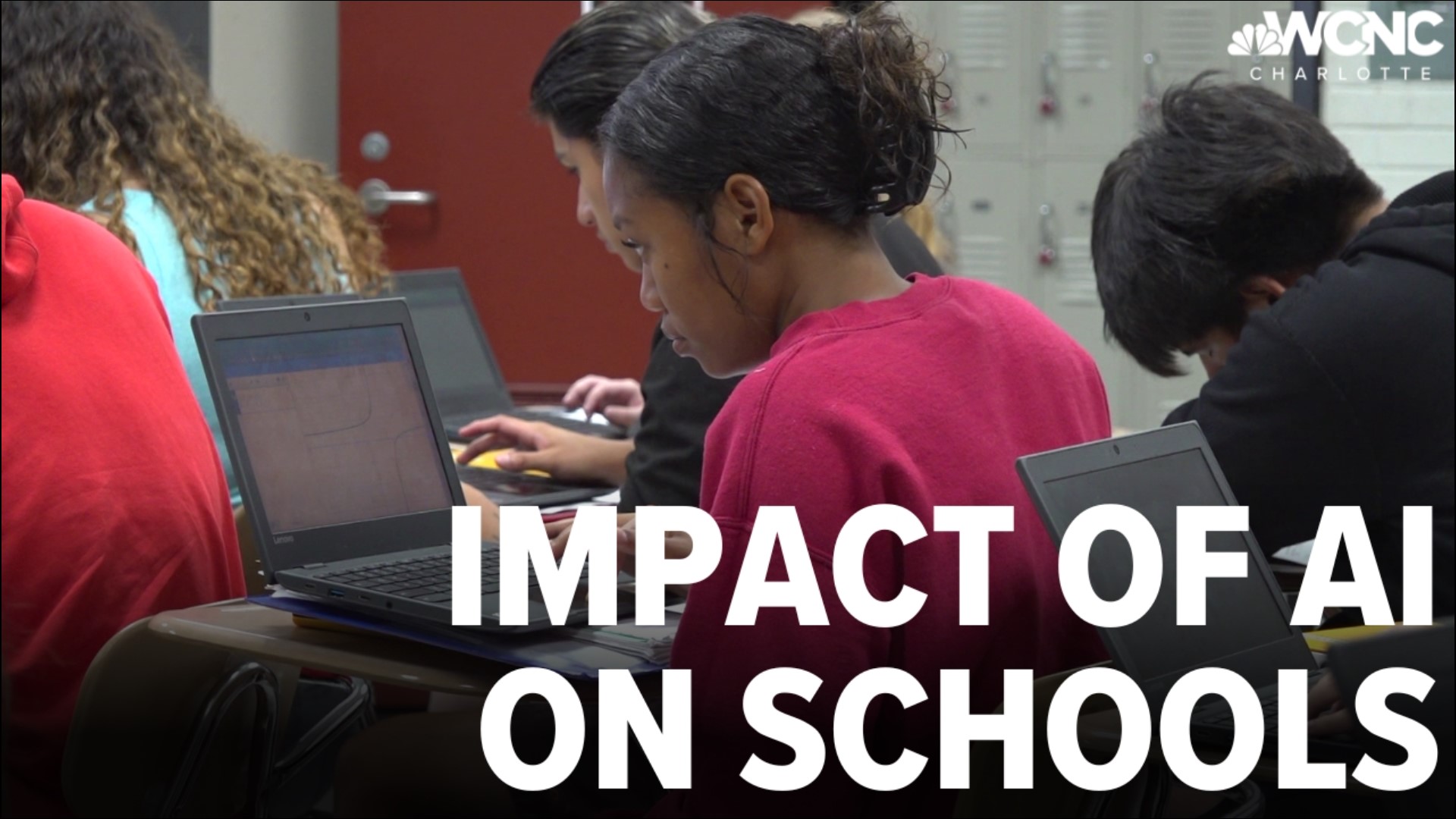CHARLOTTE, N.C. — Artificial intelligence tools like ChatGPT and Google’s Bard have the potential to revolutionize education. Advocates say it can provide teachers with new tools and resources to help them teach more effectively.
But at the same time, there are many concerns about the effects of artificial intelligence tools. One major concern is job displacement.
One Catawba County high school teacher is embracing technology as opposed to fearing it.
Andrew Mosteller is a math teacher at Bunker Hill High School.
During Mosteller's second year of teaching, he learned about ChatGPT.
"I saw it on social media, a lot of people using it, and I started looking into it," Mosteller said. "And I just decided to be creative with it and see how I can integrate that in my classroom."
He uses ChatGPT to create things like worksheets and seating charts.
"I could, I could say, write me a 10-question worksheet on, let's say, Z scores," Mosteller said. "And so it'll think for just a moment and it very quickly will generate a 10-question worksheet on the topic that I mentioned."
Depending on who you ask, AI technology could eventually take over his job.
Mosteller doesn’t subscribe to that thinking.
"I think that if we don't take advantage of it, we're going to be sorry 5, 10, 15 years down the road," Mosteller said.
Brian Sathianathan, co-founder of Iterate.ai and an AI expert, believes there’s a place for AI technology in schools for both teachers and students.
"My advice for teachers is to get ahead of this, because the students are going to get ahead of it anyway," Sathianathan said.
Sathianathan said AI is not a replacement for human creativity or intelligence, but it’s a tool.
“Once you know how these technologies work, based on the situation, you'll become the best judge to use it or not," Sathianathan said. "Right, because the situations are specific. It's not a black or white."
Mosteller thinks he’s found the happy medium.
He says teachers should be aware of its advantages and its limitations.
"I think that if we use that as a jumping-off point, we put the human touch into what it generates," Mosteller said. "It can take work that normally takes you 30 minutes and take you five. It's not necessarily eliminating your job, but it's just making your job a whole lot easier."
The conversation about AI gets a little muddier when it comes to students using the software.
ChatGPT is not on his student’s devices, but it is indirectly influencing their learning.
"I try to limit the conversations with them about it," Mosteller said. "Because I feel like they're going to get their own education about it through social media."
At the same time, he’s trying to educate other teachers on how students may use tool powered by AI.
"Students will try to take advantage of that," Mosteller said. "Maybe not in the math side of things, because it's a lot harder to do that. But definitely in the English side of things."
Most of the school districts and universities in our area told us they were still in the early stages of considering the policies and uses of AI technology in education.
Sathianathan compares ChatGPT and other AI resources to a calculator.
"When you were like a second grader, you cannot use a calculator in that class, right?, Sathianathan said.
He said that's because you needed to understand the concepts of basic math.
"But then when you are a college student, or when you are a high schooler, it doesn't matter, you can use the calculator, right?, Sathianathan said. "I mean, nobody, you know, walks into a test with a stack of papers with all your logarithmic tables."
Sathianathan said AI, like a calculator, is a powerful and useful tool and when used appropriately it works, but there are concerns.
"A lot of times kids go into this lean back mode, where they want the media and the sources, the TikToks and all that stuff to constantly entertain them," Sathianathan said. "It's coming in, but they're not producing anything. So that's something we want to watch out for in education."
Simply put, AI should supplement critical thinking skills, not replace them.
Sathianathan used the examples of social media and the internet as other technologies that were initially met with fear and uncertainty, but eventually became widely accepted and used.
"There are a lot of questions, but over time, it will grow up and things will get fixed the bias problems and all those things will get fixed over time," Sathianathan said.
Sathianathan said it's important to be open to new technologies and to learn how to use them effectively.
"Depending on the grade, depending on the classroom, depending on the situation, depending on the class, right?," Sathianathan said. "You can use leverage at ChatGPT in a very, very powerful manner."
Mosteller said that now is the time to familiarize yourself with the technology -- not after your students have.
"I want to make sure that I have every tool the student has access to," Mosteller said. "And sometimes you've got to be creative and kind of out how they could cheat before they do cheat."
We reached out to dozens of Charlotte-area schools and universities. Not all responded to our request, but the majority of those who did respond do not have a direct policy regarded AI.
Shamarria Morrison: Contact Shamarria Morrison at smorrison@wcnc.com and follow her on Facebook, Twitter and Instagram.

